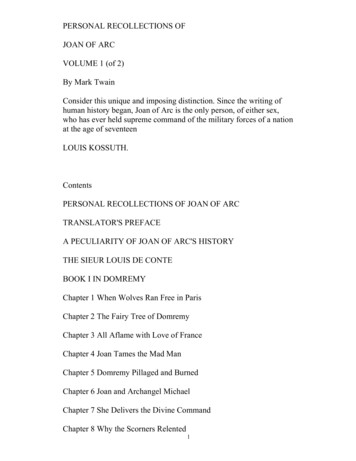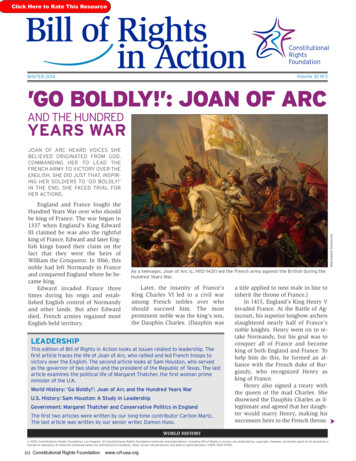
Transcription
Personal Recollections of Joan of ArcByMark TwainVolume 1 (of 2)1
VOLUME 1 (of 2)By Mark TwainConsider this unique and imposing distinction. Since the writing ofhuman history began, Joan of Arc is the only person, of either sex, whohas ever held supreme command of the military forces of a nation at theage of seventeenLOUIS KOSSUTH.2
PERSONAL RECOLLECTIONS OF JOAN OF ARCBy The Sieur Louis De Conte(her page and secretary)In Two VolumesVolume 1.Freely translated out of the ancient French into modern English from theoriginal unpublished manuscript in the National Archives of FranceBy Jean Francois AldenAuthorities examined in verification of the truthfulness of thisnarrative:J. E. J. QUICHERAT, Condamnation et Rehabilitation de Jeanne d'Arc.J. FABRE, Proces de Condamnation de Jeanne d'Arc.H. A. WALLON, Jeanne d'Arc.M. SEPET, Jeanne d'Arc.J. MICHELET, Jeanne d'Arc.BERRIAT DE SAINT-PRIX, La Famille de Jeanne d'Arc.La Comtesse A. DE CHABANNES, La Vierge Lorraine.3
Monseigneur RICARD, Jeanne d'Arc la Venerable.Lord RONALD GOWER, F.S.A., Joan of Arc. JOHN O'HAGAN, Joan of Arc.JANET TUCKEY, Joan of Arc the Maid.TRANSLATOR'S PREFACETo arrive at a just estimate of a renowned man's character one mustjudge it by the standards of his time, not ours. Judged by the standardsof one century, the noblest characters of an earlier one lose much oftheir luster; judged by the standards of to-day, there is probably noillustrious man of four or five centuries ago whose character could meetthe test at all points. But the character of Joan of Arc is unique.It can be measured by the standards of all times without misgivingor apprehension as to the result. Judged by any of them, it is stillflawless, it is still ideally perfect; it still occupies the loftiestplace possible to human attainment, a loftier one than has been reachedby any other mere mortal.When we reflect that her century was the brutalest, the wickedest, therottenest in history since the darkest ages, we are lost in wonder atthe miracle of such a product from such a soil. The contrast between herand her century is the contrast between day and night. She was truthfulwhen lying was the common speech of men; she was honest when honesty wasbecome a lost virtue; she was a keeper of promises when the keeping of4
a promise was expected of no one; she gave her great mind to greatthoughts and great purposes when other great minds wasted themselvesupon pretty fancies or upon poor ambitions; she was modest, and fine,and delicate when to be loud and coarse might be said to be universal;she was full of pity when a merciless cruelty was the rule; she wassteadfast when stability was unknown, and honorable in an age which hadforgotten what honor was; she was a rock of convictions in a time whenmen believed in nothing and scoffed at all things; she was unfailinglytrue to an age that was false to the core; she maintained her personaldignity unimpaired in an age of fawnings and servilities; she was of adauntless courage when hope and courage had perished in the hearts ofher nation; she was spotlessly pure in mind and body when society in thehighest places was foul in both—she was all these things in an age whencrime was the common business of lords and princes, and when the highestpersonages in Christendom were able to astonish even that infamous eraand make it stand aghast at the spectacle of their atrocious lives blackwith unimaginable treacheries, butcheries, and beastialities.She was perhaps the only entirely unselfish person whose name has aplace in profane history. No vestige or suggestion of self-seeking canbe found in any word or deed of hers. When she had rescued her Kingfrom his vagabondage, and set his crown upon his head, she was offeredrewards and honors, but she refused them all, and would take nothing.All she would take for herself—if the King would grant it—was leaveto go back to her village home, and tend her sheep again, and feelher mother's arms about her, and be her housemaid and helper. The5
selfishness of this unspoiled general of victorious armies, companion ofprinces, and idol of an applauding and grateful nation, reached but thatfar and no farther.The work wrought by Joan of Arc may fairly be regarded as ranking anyrecorded in history, when one considers the conditions under which itwas undertaken, the obstacles in the way, and the means at her disposal.Caesar carried conquests far, but he did it with the trained andconfident veterans of Rome, and was a trained soldier himself; andNapoleon swept away the disciplined armies of Europe, but he also was atrained soldier, and he began his work with patriot battalions inflamedand inspired by the miracle-working new breath of Liberty breathed uponthem by the Revolution—eager young apprentices to the splendid trade ofwar, not old and broken men-at-arms, despairing survivors of an age-longaccumulation of monotonous defeats; but Joan of Arc, a mere child inyears, ignorant, unlettered, a poor village girl unknown and withoutinfluence, found a great nation lying in chains, helpless and hopelessunder an alien domination, its treasury bankrupt, its soldiersdisheartened and dispersed, all spirit torpid, all courage dead in thehearts of the people through long years of foreign and domestic outrageand oppression, their King cowed, resigned to its fate, and preparingto fly the country; and she laid her hand upon this nation, this corpse,and it rose and followed her. She led it from victory to victory, sheturned back the tide of the Hundred Years' War, she fatally crippled theEnglish power, and died with the earned title of DELIVERER OF FRANCE,which she bears to this day.6
And for all reward, the French King, whom she had crowned, stood supineand indifferent, while French priests took the noble child, the mostinnocent, the most lovely, the most adorable the ages have produced, andburned her alive at the stake.A PECULIARITY OF JOAN OF ARC'S HISTORYThe details of the life of Joan of Arc form a biography which is uniqueamong the world's biographies in one respect: It is the only story of ahuman life which comes to us under oath, the only one which comes to usfrom the witness-stand. The official records of the Great Trial of 1431,and of the Process of Rehabilitation of a quarter of a century later,are still preserved in the National Archives of France, and they furnishwith remarkable fullness the facts of her life. The history of no otherlife of that remote time is known with either the certainty or thecomprehensiveness that attaches to hers.The Sieur Louis de Conte is faithful to her official history inhis Personal Recollections, and thus far his trustworthiness isunimpeachable; but his mass of added particulars must depend for creditupon his word alone.7
THE TRANSLATOR.THE SIEUR LOUIS DE CONTETo his Great-Great-Grand Nephews and NiecesThis is the year 1492. I am eighty-two years of age. The things I amgoing to tell you are things which I saw myself as a child and as ayouth.In all the tales and songs and histories of Joan of Arc, which you andthe rest of the world read and sing and study in the books wrought inthe late invented art of printing, mention is made of me, the SieurLouis de Conte—I was her page and secretary, I was with her from thebeginning until the end.I was reared in the same village with her. I played with her every day,when we were little children together, just as you play with your mates.Now that we perceive how great she was, now that her name fills thewhole world, it seems strange that what I am saying is true; for it isas if a perishable paltry candle should speak of the eternal sun ridingin the heavens and say, "He was gossip and housemate to me when wewere candles together." And yet it is true, just as I say. I was her8
playmate, and I fought at her side in the wars; to this day I carry inmy mind, fine and clear, the picture of that dear little figure, withbreast bent to the flying horse's neck, charging at the head of thearmies of France, her hair streaming back, her silver mail plowingsteadily deeper and deeper into the thick of the battle, sometimesnearly drowned from sight by tossing heads of horses, upliftedsword-arms, wind-blow plumes, and intercepting shields. I was with herto the end; and when that black day came whose accusing shadow will liealways upon the memory of the mitered French slaves of England who wereher assassins, and upon France who stood idle and essayed no rescue, myhand was the last she touched in life.As the years and the decades drifted by, and the spectacle of themarvelous child's meteor flight across the war firmament of Franceand its extinction in the smoke-clouds of the stake receded deeper anddeeper into the past and grew ever more strange, and wonderful, anddivine, and pathetic, I came to comprehend and recognize her at last forwhat she was—the most noble life that was ever born into this world saveonly One.BOOK I IN DOMREMY9
Chapter 1 When Wolves Ran Free in ParisI, THE SIEUR LOUIS DE CONTE, was born in Neufchateau, on the 6th ofJanuary, 1410; that is to say, exactly two years before Joan of Arc wasborn in Domremy. My family had fled to those distant regions from theneighborhood of Paris in the first years of the century. In politicsthey were Armagnacs—patriots; they were for our own French King, crazyand impotent as he was. The Burgundian party, who were for the English,had stripped them, and done it well. They took everything but myfather's small nobility, and when he reached Neufchateau he reached itin poverty and with a broken spirit. But the political atmosphere therewas the sort he liked, and that was something. He came to a region ofcomparative quiet; he left behind him a region peopled with furies,madmen, devils, where slaughter was a daily pastime and no man's lifesafe for a moment. In Paris, mobs roared through the streets nightly,sacking, burning, killing, unmolested, uninterrupted. The sun rose uponwrecked and smoking buildings, and upon mutilated corpses lying here,there, and yonder about the streets, just as they fell, and strippednaked by thieves, the unholy gleaners after the mob. None had thecourage to gather these dead for burial; they were left there to rot andcreate plagues.And plagues they did create. Epidemics swept away the people likeflies, and the burials were conducted secretly and by night, for public10
funerals were not allowed, lest the revelation of the magnitude of theplague's work unman the people and plunge them into despair. Then came,finally, the bitterest winter which had visited France in five hundredyears. Famine, pestilence, slaughter, ice, snow—Paris had all these atonce. The dead lay in heaps about the streets, and wolves entered thecity in daylight and devoured them.Ah, France had fallen low—so low! For more than three quarters of acentury the English fangs had been bedded in her flesh, and so cowedhad her armies become by ceaseless rout and defeat that it was said andaccepted that the mere sight of an English army was sufficient to put aFrench one to flight.When I was five years old the prodigious disaster of Agincourt fell uponFrance; and although the English King went home to enjoy his glory, heleft the country prostrate and a prey to roving bands of Free Companionsin the service of the Burgundian party, and one of these bands cameraiding through Neufchateau one night, and by the light of our burningroof-thatch I saw all that were dear to me in this world (save an elderbrother, your ancestor, left behind with the court) butchered whilethey begged for mercy, and heard the butchers laugh at their prayers andmimic their pleadings. I was overlooked, and escaped without hurt. Whenthe savages were gone I crept out and cried the night away watching theburning houses; and I was all alone, except for the company of the deadand the wounded, for the rest had taken flight and hidden themselves.11
I was sent to Domremy, to the priest, whose housekeeper became a lovingmother to me. The priest, in the course of time, taught me to read andwrite, and he and I were the only persons in the village who possessedthis learning.At the time that the house of this good priest, Guillaume Fronte, becamemy home, I was six years old. We lived close by the village church, andthe small garden of Joan's parents was behind the church. As to thatfamily there were Jacques d'Arc the father, his wife Isabel Romee; threesons—Jacques, ten years old, Pierre, eight, and Jean, seven; Joan, four,and her baby sister Catherine, about a year old. I had thesechildren for playmates from the beginning. I had some other playmatesbesides—particularly four boys: Pierre Morel, Etienne Roze, NoelRainguesson, and Edmond Aubrey, whose father was maire at that time;also two girls, about Joan's age, who by and by became her favorites;one was named Haumetter, the other was called Little Mengette. Thesegirls were common peasant children, like Joan herself. When they grewup, both married common laborers. Their estate was lowly enough, yousee; yet a time came, many years after, when no passing stranger,howsoever great he might be, failed to go and pay his reverence tothose two humble old women who had been honored in their youth by thefriendship of Joan of Arc.These were all good children, just of the ordinary peasant type;not bright, of course—you would not expect that—but good-hearted andcompanionable, obedient to their parents and the priest; and as they12
grew up they became properly stocked with narrowness and prejudicesgot at second hand from their elders, and adopted without reserve; andwithout examination also—which goes without saying. Their religion wasinherited, their politics the same. John Huss and his sort might findfault with the Church, in Domremy it disturbed nobody's faith; and whenthe split came, when I was fourteen, and we had three Popes at once,nobody in Domremy was worried about how to choose among them—the Pope ofRome was the right one, a Pope outside of Rome was no Pope at all.Every human creature in the village was an Armagnac—a patriot—and if wechildren hotly hated nothing else in the world, we did certainly hatethe English and Burgundian name and polity in that way.Chapter 2 The Fairy Tree of DomremyOUR DOMREMY was like any other humble little hamlet of that remote timeand region. It was a maze of crooked, narrow lanes and alleys shaded andsheltered by the overhanging thatch roofs of the barnlike houses. Thehouses were dimly lighted by wooden-shuttered windows—that is, holes inthe walls which served for windows. The floors were dirt, and there wasvery little furniture. Sheep and cattle grazing was the main industry;all the young folks tended flocks.13
The situation was beautiful. From one edge of the village a floweryplain extended in a wide sweep to the river—the Meuse; from the rearedge of the village a grassy slope rose gradually, and at the top wasthe great oak forest—a forest that was deep and gloomy and dense, andfull of interest for us children, for many murders had been done in itby outlaws in old times, and in still earlier times prodigious dragonsthat spouted fire and poisonous vapors from their nostrils had theirhomes in there. In fact, one was still living in there in our own time.It was as long as a tree, and had a body as big around as a tierce, andscales like overlapping great tiles, and deep ruby eyes as large as acavalier's hat, and an anchor-fluke on its tail as big as I don't knowwhat, but very big, even unusually so for a dragon, as everybodysaid who knew about dragons. It was thought that this dragon was of abrilliant blue color, with gold mottlings, but no one had ever seen it,therefore this was not known to be so, it was only an opinion. It wasnot my opinion; I think there is no sense in forming an opinion whenthere is no evidence to form it on. If you build a person without anybones in him he may look fair enough to the eye, but he will be limberand cannot stand up; and I consider that evidence is the bones of anopinion. But I will take up this matter more at large at another time,and try to make the justness of my position appear. As to that dragon,I always held the belief that its color was gold and without blue, forthat has always been the color of dragons. That this dragon lay but alittle way within the wood at one time is shown by the fact that PierreMorel was in there one day and smelt it, and recognized it by the smell.It gives one a horrid idea of how near to us the deadliest danger can be14
and we not suspect it.In the earliest times a hundred knights from many remote places in theearth would have gone in there one after another, to kill the dragon andget the reward, but in our time that method had gone out, and the priesthad become the one that abolished dragons. Pere Guillaume Fronte did itin this case. He had a procession, with candles and incense and banners,and marched around the edge of the wood and exorcised the dragon, and itwas never heard of again, although it was the opinion of many that thesmell never wholly passed away. Not that any had ever smelt the smellagain, for none had; it was only an opinion, like that other—and lackedbones, you see. I know that the creature was there before the exorcism,but whether it was there afterward or not is a thing which I cannot beso positive about.In a noble open space carpeted with grass on the high ground towardVaucouleurs stood a most majestic beech tree with wide-reaching arms anda grand spread of shade, and by it a limpid spring of cold water; and onsummer days the children went there—oh, every summer for more than fivehundred years—went there and sang and danced around the tree for hourstogether, refreshing themselves at the spring from time to time, andit was most lovely and enjoyable. Also they made wreaths of flowers andhung them upon the tree and about the spring to please the fairies thatlived there; for they liked that, being idle innocent little creatures,as all fairies are, and fond of anything delicate and pretty like wildflowers put together in that way. And in return for this attention the15
fairies did any friendly thing they could for the children, such askeeping the spring always full and clear and cold, and driving awayserpents and insects that sting; and so there was never any unkindnessbetween the fairies and the children during more than five hundredyears—tradition said a thousand—but only the warmest affection and themost perfect trust and confidence; and whenever a child died the fairiesmourned just as that child's playmates did, and the sign of it was thereto see; for before the dawn on the day of the funeral they hung a littleimmortelle over the place where that child was used to sit under thetree. I know this to be true by my own eyes; it is not hearsay. And thereason it was known that the fairies did it was this—that it was madeall of black flowers of a sort not known in France anywhere.Now from time immemorial all children reared in Domremy were called theChildren of the Tree; and they loved that name, for it carried with ita mystic privilege not granted to any others of the children of thisworld. Which was this: whenever one of these came to die, then beyondthe vague and formless images drifting through his darkening mind rosesoft and rich and fair a vision of the Tree—if all was well with hissoul. That was what some said. Others said the vision came in two ways:once as a warning, one or two years in advance of death, when the soulwas the captive of sin, and then the Tree appeared in its desolatewinter aspect—then that soul was smitten with an awful fear. Ifrepentance came, and purity of life, the vision came again, this timesummer-clad and beautiful; but if it were otherwise with that soul thevision was withheld, and it passed from life knowing its doom. Still16
others said that the vision came but once, and then only to the sinlessdying forlorn in distant lands and pitifully longing for some last dearreminder of their home. And what reminder of it could go to their heartslike the picture of the Tree that was the darling of their love and thecomrade of their joys and comforter of their small griefs all throughthe divine days of their vanished youth?Now the several traditions were as I have said, some believing one andsome another. One of them I knew to be the truth, and that was the lastone. I do not say anything against the others; I think they were true,but I only know that the last one was; and it is my thought that if onekeep to the things he knows, and not trouble about the things which hecannot be sure about, he will have the steadier mind for it—and there isprofit in that. I know that when the Children of the Tree die in a farland, then—if they be at peace with God—they turn their longing eyestoward home, and there, far-shining, as through a rift in a cloud thatcurtains heaven, they see the soft picture of the Fairy Tree, clothedin a dream of golden light; and they see the bloomy mead sloping away tothe river, and to their perishing nostrils is blown faint and sweetthe fragrance of the flowers of home. And then the vision fades andpasses—but they know, they know! and by their transfigured faces youknow also, you who stand looking on; yes, you know the message that hascome, and that it has come from heaven.Joan and I believed alike about this matter. But Pierre Morel andJacques d'Arc, and many others believed that the vision appeared17
twice—to a sinner. In fact, they and many others said they knew it.Probably because their fathers had known it and had told them; for onegets most things at second hand in this world.Now one thing that does make it quite likely that there were really twoapparitions of the Tree is this fact: From the most ancient times if onesaw a villager of ours with his face ash-white and rigid with a ghastlyfright, it was common for every one to whisper to his neighbor, "Ah, heis in sin, and has got his warning." And the neighbor would shudder atthe thought and whisper back, "Yes, poor soul, he has seen the Tree."Such evidences as these have their weight; they are not to be putaside with a wave of the hand. A thing that is backed by the cumulativeevidence of centuries naturally gets nearer and nearer to being proofall the time; and if this continue and continue, it will some day becomeauthority—and authority is a bedded rock, and will abide.In my long life I have seen several cases where the tree appearedannouncing a death which was still far away; but in none of these wasthe person in a state of sin. No; the apparition was in these casesonly a special grace; in place of deferring the tidings of that soul'sredemption till the day of death, the apparition brought them longbefore, and with them peace—peace that might no more be disturbed—theeternal peace of God. I myself, old and broken, wait with serenity; forI have seen the vision of the Tree. I have seen it, and am content.18
Always, from the remotest times, when the children joined hands anddanced around the Fairy Tree they sang a song which was the Tree's song,the song of L'Arbre fee de Bourlemont. They sang it to a quaint sweetair—a solacing sweet air which has gone murmuring through my dreamingspirit all my life when I was weary and troubled, resting me andcarrying me through night and distance home again. No stranger can knowor feel what that song has been, through the drifting centuries, toexiled Children of the Tree, homeless and heavy of heart in countriesforeign to their speech and ways. You will think it a simple thing, thatsong, and poor, perchance; but if you will remember what it was tous, and what it brought before our eyes when it floated through ourmemories, then you will respect it. And you will understand how thewater wells up in our eyes and makes all things dim, and our voicesbreak and we cannot sing the last lines:"And when, in Exile wand'ring, we Shall fainting yearn for glimpse ofthee, Oh, rise upon our sight!"And you will remember that Joan of Arc sang this song with us around theTree when she was a little child, and always loved it. And that hallowsit, yes, you will grant that:L'ARBRE FEE DE BOURLEMONTSONG OF THE CHILDREN19
Now what has kept your leaves so green,Arbre Fee de Bourlemont?The children's tears! They brought each grief,And you did comfort them and cheerTheir bruised hearts, and steal a tearThat, healed, rose a leaf.And what has built you up so strong,Arbre Fee de Bourlemont?The children's love! They've loved you longTen hundred years, in sooth,They've nourished you with praise and song,And warmed your heart and kept it young—A thousand years of youth!Bide always green in our young hearts,Arbre Fee de Bourlemont!And we shall always youthful be,Not heeding Time his flight;And when, in exile wand'ring, weShall fainting yearn for glimpse of thee,Oh, rise upon our sight!20
The fairies were still there when we were children, but we never sawthem; because, a hundred years before that, the priest of Domremy hadheld a religious function under the tree and denounced them as beingblood-kin to the Fiend and barred them from redemption; and thenhe warned them never to show themselves again, nor hang any moreimmortelles, on pain of perpetual banishment from that parish.All the children pleaded for the fairies, and said they were their goodfriends and dear to them and never did them any harm, but the priestwould not listen, and said it was sin and shame to have such friends.The children mourned and could not be comforted; and they made anagreement among themselves that they would always continue to hangflower-wreaths on the tree as a perpetual sign to the fairies that theywere still loved and remembered, though lost to sight.But late one night a great misfortune befell. Edmond Aubrey's motherpassed by the Tree, and the fairies were stealing a dance, not thinkinganybody was by; and they were so busy, and so intoxicated with the wildhappiness of it, and with the bumpers of dew sharpened up with honeywhich they had been drinking, that they noticed nothing; so Dame Aubreystood there astonished and admiring, and saw the little fantastic atomsholding hands, as many as three hundred of them, tearing around in agreat ring half as big as an ordinary bedroom, and leaning away backand spreading their mouths with laughter and song, which she could hearquite distinctly, and kicking their legs up as much as three inches21
from the ground in perfect abandon and hilarity—oh, the very maddest andwitchingest dance the woman ever saw.But in about a minute or two minutes the poor little ruined creaturesdiscovered her. They burst out in one heartbreaking squeak of grief andterror and fled every which way, with their wee hazel-nut fists in theireyes and crying; and so disappeared.The heartless woman—no, the foolish woman; she was not heartless, butonly thoughtless—went straight home and told the neighbors all about it,whilst we, the small friends of the fairies, were asleep and not wittingthe calamity that was come upon us, and all unconscious that we ought tobe up and trying to stop these fatal tongues. In the morning everybodyknew, and the disaster was complete, for where everybody knows a thingthe priest knows it, of course. We all flocked to Pere Fronte, cryingand begging—and he had to cry, too, seeing our sorrow, for he had a mostkind and gentle nature; and he did not want to banish the fairies, andsaid so; but said he had no choice, for it had been decreed that if theyever revealed themselves to man again, they must go. This all happenedat the worst time possible, for Joan of Arc was ill of a fever and outof her head, and what could we do who had not her gifts of reasoning andpersuasion? We flew in a swarm to her bed and cried out, "Joan, wake!Wake, there is no moment to lose! Come and plead for the fairies—comeand save them; only you can do it!"But her mind was wandering, she did not know what we said nor what we22
meant; so we went away knowing all was lost. Yes, all was lost, foreverlost; the faithful friends of the children for five hundred years mustgo, and never come back any more.It was a bitter day for us, that day that Pere Fronte held the functionunder the tree and banished the fairies. We could not wear mourning thatany could have noticed, it would not have been allowed; so we had to becontent with some poor small rag of black tied upon our garments whereit made no show; but in our hearts we wore mourning, big and noble andoccupying all the room, for our hearts were ours; they could not get atthem to prevent that.The great tree—l'Arbre Fee de Bourlemont was its beautiful name—wasnever afterward quite as much to us as it had been before, but it wasalways dear; is dear to me yet when I go there now, once a year in myold age, to sit under it and bring back the lost playmates of my youthand group them about me and look upon their faces through my tearsand break my heart, oh, my God! No, the place was not quite the sameafterward. In one or two ways it could not be; for, the fairies'protection being gone, the spring lost much of its freshness andcoldness, and more than two-thirds of its volume, and the banishedserpents and stinging insects returned, and multiplied, and became atorment and have remained so to this day.When that wise little child, Joan, got well, we realized how much herillness had cost us; for we found that we had been right in believing23
she could save the fairies. She burst into a great storm of anger, forso little a creature, and went straight to Pere Fronte, and stood upbefore him where he sat, and made reverence and said:"The fairies were to go if they showed themselves to people again, is itnot so?""Yes, that was it, dear.""If a man comes prying into a person's room at midnight when that personis half-naked, will you be so unjust as to say that that person isshowing himself to that man?""Well—no." The good priest looked a little troubled and uneasy
Personal Recollections of Joan of Arc By Mark Twain Volume 1 (of 2) 2 VOLUME 1 (of 2) By Mark Twain Consider this unique and imposing distinction. Since the writing of human history began, Joan of Arc is the only person, of either sex, who has ever held supreme command of the military forces of a nation at the age of seventeen LOUIS KOSSUTH. 3










